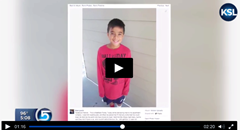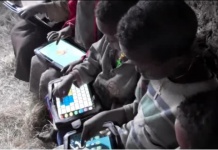 A book-starved Utah boy who was so bored he begged the postman for junk mail.
A book-starved Utah boy who was so bored he begged the postman for junk mail.
Instead mailman Ron Lynch asked his Facebook friends to donate books for young Mathew Flores.
Scads of people from all over the world responded.
Enough said? Not quite. You see, the big question is why Mathew lacked access to books in the first place. Turns out that his family didn’t own a car and Mathew even had trouble scraping up bus fare. So goes his version of the facts. True? I don’t know. But now let’s imagine another story.
Suppose Net connections and the right gadgets were available at home for the poor, so they could tap into public libraries remotely. Never again would Mathew’s fare be limited to junk mail and the like. Granted, e-books at home are no replacement for library visits and inspiration by librarians in person. But they can still help libraries stretch resources at a time when U.S. public libraries can spend only about $4 per capita on books and other content.
The key is the creation of a national digital library endowment and well-stocked national digital library systems to deal with the issue of book deserts—either at the neighborhood level or within individual households. Significantly, a powerful relationship exists between recreational reading and academic achievement.
While the endowment could not single-handedly boost book spending to proper levels or completely address libraries’ other financial woes, it would at least help.
Related: National Digital Library Endowment proposal makes Education Week. I coauthored the piece with Jim Duncan, executive director of the Colorado Library Consortium.


































A couple things troubled me about the story. One, the video shows him playing with an expensive set of Legos. They can afford expensive toys but not books?
Second, doesn’t he go to school? Most schools maintain libraries and classes usually make full use of them.
Besides that, most schools distribute the Scholastic Book flyers that offer inexpensive books. Even when I was a kid in the 60s and my family quite poor, we were able to get a book or two that way.
Lorraine, your analysis is very credible, and I’m glad I raised questions about the truthfulness of the boy’s story.
Assuming that the family bought the Legos, the issue to an extent could be one of values and priorities. Still, the question arises of whether we should make it as easy as possible for families outside the book culture to catch up with books. I say we should.
As for school libraries, we don’t know the full facts. What kind of collection does his school have? How good are teachers and others in guiding the students to the right books it? As we know, content alone is not enough.
Thanks,
David